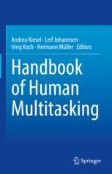Search
Search Results
-
Sensorimotor learning during synchronous speech is modulated by the acoustics of the other voice
This study tested the hypothesis that speaking with other voices can influence sensorimotor predictions of one’s own voice. Real-time manipulations...

-
Word learning in ASD: the sensorimotor, the perceptual and the symbolic
Word learning requires successful pairing of form and meaning. A common hypothesis about the process of word learning is that initially, infants work...

-
The limits of automatic sensorimotor processing during word processing: investigations with repeated linguistic experience, memory consolidation during sleep, and rich linguistic learning contexts
While a number of studies have repeatedly demonstrated an automatic activation of sensorimotor experience during language processing in the form of...

-
TRACK—a new algorithm and open-source tool for the analysis of pursuit-tracking sensorimotor integration processes
In daily life, sensorimotor integration processes are fundamental for many cognitive operations. The pursuit-tracking paradigm is an ecological and...

-
Action, emotion, and music-colour synaesthesia: an examination of sensorimotor and emotional responses in synaesthetes and non-synaesthetes
Synaesthesia has been conceptualised as a joining of sensory experiences. Taking a holistic, embodied perspective, we investigate in this paper the...

-
Mobile version of the Battery for the Assessment of Auditory Sensorimotor and Timing Abilities (BAASTA): Implementation and adult norms
Timing and rhythm abilities are complex and multidimensional skills that are highly widespread in the general population. This complexity can be...

-
Investigating how Explicit Contextual Cues Affect Predictive Sensorimotor Control in Autistic Adults
Research suggests that sensorimotor difficulties in autism could be reduced by providing individuals with explicit contextual information. To test...

-
Measuring motion-to-photon latency for sensorimotor experiments with virtual reality systems
Consumer virtual reality (VR) systems are increasingly being deployed in research to study sensorimotor behaviors, but properties of such systems...

-
Singing ability is related to vocal emotion recognition: Evidence for shared sensorimotor processing across speech and music
The ability to recognize emotion in speech is a critical skill for social communication. Motivated by previous work that has shown that vocal emotion...

-
Quantifying children’s sensorimotor experience: Child body–object interaction ratings for 3359 English words
Body–object interaction (BOI) ratings measure how easily the human body can physically interact with a word's referent. Previous research has found...

-
Temporal Structure in Sensorimotor Variability: A Stable Trait, But What For?
Human performance shows substantial endogenous variability over time, and this variability is a robust marker of individual differences. Of growing...

-
Development of Restricted and Repetitive Behaviors from 2–19: Stability and Change in Repetitive Sensorimotor, Insistence on Sameness, and Verbal Behaviors in a Longitudinal Study of Autism
This study examined trajectories of repetitive sensorimotor (RSM), insistence on sameness (IS), and verbal RRBs from ages 2–19 in a...

-
Multitasking During Continuous Task Demands: The Cognitive Costs of Concurrent Sensorimotor Activities
Multitasking between continuous sensorimotor and cognitive activities is a frequent requirement of diverse activities in daily life, such as walking...
-
The development of human causal learning and reasoning
Causal understanding is a defining characteristic of human cognition. Like many animals, human children learn to control their bodily movements and...

-
Learning motor actions via imagery—perceptual or motor learning?
It is well accepted that repeatedly imagining oneself acting without any overt behavior can lead to learning. The prominent theory accounting for why...
-
Stimulus-locked auditory information facilitates real-time visuo-motor sequence learning
Prior research investigating whether and how multisensory information facilitates skill learning is quite mixed; whereas some research points to...

-
Learning via imagery – merging techniques to improve the outcomes: a commentary on Frank et al. (2023)
In their article, Frank and colleagues review the effectiveness of motor imagery in learning motor skills, proposing a perceptual-cognitive theory...
-
Commentary on Frank et al., (2003): where does learning through motor imagery lie on the perceptual–motor continuum?
In this issue, Frank et al. (2023) propose that motor imagery provides a perceptual–cognitive scaffold allowing ‘perceptual’ learning to transfer...
-
Sensorimotor Intervention Group for Children with ADHD and Sensory Processing Difficulties: A Feasibility Study
Many children with Attention-Deficit/Hyperactivity Disorder (ADHD) also have sensory processing difficulties, yet there are few evidence-based...

-
Concurrent visual sequence learning
Many researchers in the field of implicit statistical learning agree that there does not exist one general implicit learning mechanism, but rather,...

